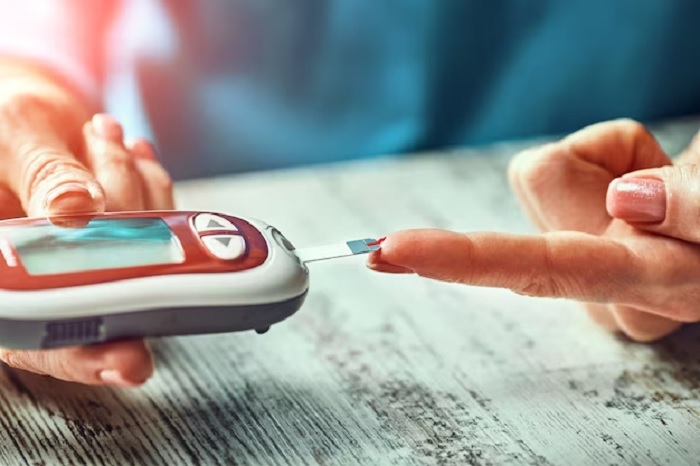Fasting blood sugar (FBS) is a blood test that measures the amount of glucose (sugar) in the blood after a period of fasting, typically for at least 8 hours. It is a common test use to diagnose and monitor diabetes, a chronic condition that affects the body’s ability to regulate blood sugar levels.
During a period of fasting, the body relies on stored glucose in the liver to maintain normal blood sugar levels. A fasting plasma glucose test measures the amount of glucose in the blood before eating or drinking anything other than water in the morning, when the body has been in a fasting state for at least 8 hours.
Fasting plasma glucose normal range lies between 70 and 99 milligrams per deciliter (mg/dL). Levels between 100 and 125 mg/dL may indicate prediabetes, while levels of 126 mg/dL or higher on two separate tests may indicate diabetes.
Importance of Fasting Blood Sugar Test
Fasting plasma glucose test costs are different from city to city. If you are in Hyderabad, you may check the cost for this test at Vijaya Diagnostics. This test is important for several reasons:
- Diagnosis of Diabetes: A fasting blood sugar test is commonly used to diagnose diabetes. Elevated fasting blood sugar levels indicate that the body is not producing enough insulin or is not using insulin effectively, which is a hallmark of diabetes.
- Screening for Prediabetes: Prediabetes is a condition in which blood sugar levels are higher than normal but not high enough to be classified as diabetes. A fasting blood sugar test can help identify individuals who are at risk for developing diabetes and enable early intervention to prevent or delay the onset of the disease.
- Monitoring of Diabetes: People with diabetes may need to monitor their fasting blood sugar levels regularly to assess the effectiveness of their treatment plan and make adjustments as needed.
- Assessment of Overall Health: A fasting blood sugar test can provide important information about a person’s overall health and may be use to screen for other medical conditions that affect blood sugar levels, such as pancreatic disorders or hormonal imbalances.
Procedure for Conducting Fasting sugar test
The procedure for conducting a fasting blood sugar test typically involves the following steps:
- Preparation: The healthcare provider will instruct the patient to fast for at least 8 hours before the test, usually overnight. During this time, the patient should avoid eating or drinking anything other than water.
- Blood Sample Collection: The healthcare provider will collect a blood sample from the patient, typically by inserting a needle into a vein in the arm. The blood sample is then sent to a laboratory for analysis.
- Analysis: The laboratory will measure the amount of glucose (sugar) in the blood sample. This measurement is report in milligrams per deciliter (mg/dL).
- Interpretation: The healthcare provider will interpret the results of the test and discuss them with the patient. Normal fasting blood sugar levels typically range between 70 and 99 mg/dL. Levels between 100 and 125 mg/dL may indicate prediabetes, while levels of 126 mg/dL or higher on two separate tests may indicate diabetes.
It is important to follow the healthcare provider’s instructions for fasting before the test to ensure accurate results. In some cases, additional tests may be need to confirm a diagnosis of diabetes or prediabetes. It is also important to work with a healthcare provider to interpret fasting blood sugar test results and develop an appropriate treatment plan if needed.
There are other blood sugar tests that can be done in addition to the FPG test, such as:
- Oral Glucose Tolerance Test (OGTT): This test measures blood sugar levels before and 2 hours after drinking a sugary drink. It is use to diagnose gestational diabetes and prediabetes.
- Random Blood Sugar Test: This test measures blood sugar levels at any time of the day, regardless of when the person last ate. It is use to diagnose diabetes and to monitor blood sugar levels in people with diabetes.
- Hemoglobin A1c Test (HbA1c): This test measures the average blood sugar levels over the past 2-3 months. It is use to diagnose diabetes and to monitor blood sugar control in people with diabetes.
However, none of these tests are consider fasting blood sugar tests as they do not require a period of fasting before the test.
The frequency of fasting blood sugar testing depends on a person’s individual health status and risk factors for developing diabetes. Generally, people with normal fasting blood sugar levels who have no other risk factors for diabetes may only need to have a fasting blood sugar test once every 3-5 years as part of their routine health checkups. However, people with risk factors for diabetes or other medical conditions that affect blood sugar levels may need to have more frequent testing.
The American Diabetes Association (ADA) recommends that people with diabetes or prediabetes have their fasting blood sugar levels checked at least twice a year. People with well-controlled diabetes and stable blood sugar levels may be able to have less frequent testing, while those with poorly controlled diabetes or frequent fluctuations in blood sugar levels may need more frequent testing.
In addition to regular fasting blood sugar testing, it is important for individuals to monitor their blood sugar levels regularly at home if they have diabetes, and to work closely with their healthcare provider to develop an individualized plan for blood sugar monitoring and management.
What do the Results of a Fasting Blood Sugar Test mean?
The results of a fasting blood sugar test are measured in milligrams per deciliter (mg/dL). A normal fasting blood sugar level is less than 100 mg/dL. A fasting blood sugar level between 100 and 125 mg/dL is considered prediabetes. A fasting blood sugar level of 126 mg/dL or higher is considered diabetes.
If you have prediabetes, you have a higher risk of developing diabetes. However, there are lifestyle changes you can make to lower your risk, such as eating a healthy diet, exercising regularly, and maintaining a healthy weight.
If you have diabetes, your doctor will work with you to develop a treatment plan to manage your blood sugar levels. This may include diet, exercise, medication, or insulin therapy.
How to Prepare for a Fasting Blood Sugar Test
To prepare for a fasting blood sugar test, you should not eat or drink anything for at least 8 hours before the test. However, you can drink water.
You should also tell your doctor about all of the medications you are taking, including over-the-counter medications and herbal supplements. Some medications can affect your blood sugar levels.



